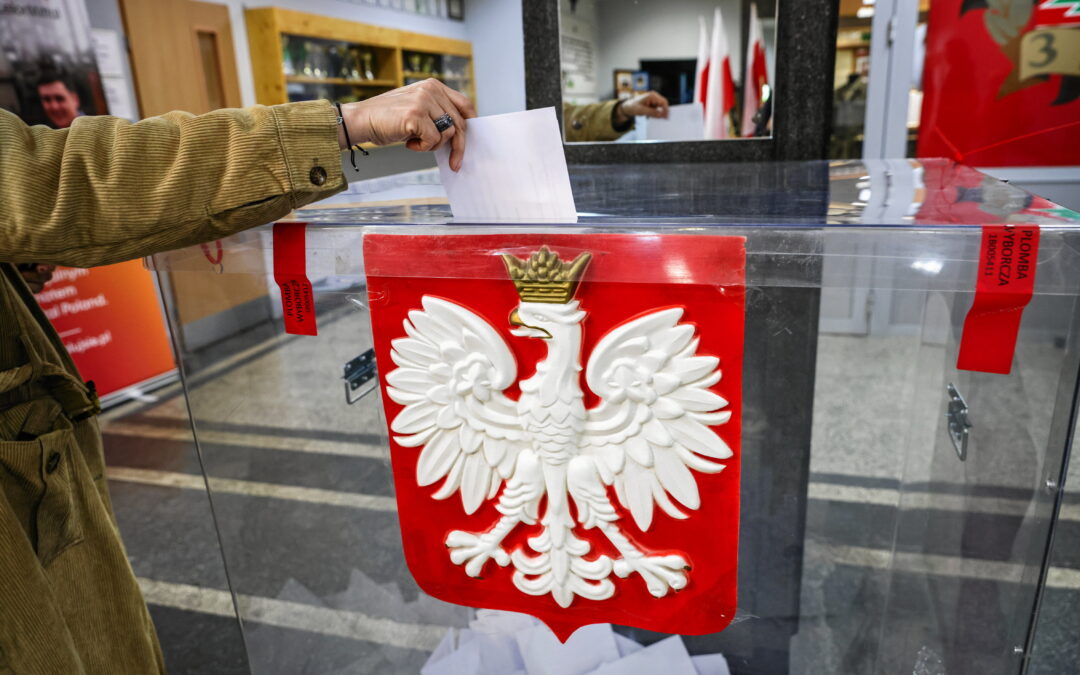Keep our news free from ads and paywalls by making a donation to support our work!

Notes from Poland is run by a small editorial team and is published by an independent, non-profit foundation that is funded through donations from our readers. We cannot do what we do without your support.
As millions of Poles vote today in the first round of presidential elections, Ukraine’s intelligence services have issued a warning over Russian attempts to exploit the event to spread disinformation and weaken Poland’s internal unity.
“The Kremlin has activated a special operation [called] Doppelganger in the midst of elections in Poland,” wrote Defence Intelligence of Ukraine (DIU), the Ukrainian government’s military intelligence service, in a message on Telegram on Sunday morning, after voting had already begun.
DIU described the operation as “another phase of the information war against European society” and said that Doppelganger “is one of Russia’s largest and longest-running information campaigns aimed at EU and NATO countries”.
The intelligence agency said that, as part of its efforts, Russia has created websites and social media accounts that imitate genuine Western media and are used to “spread disinformation under the guise of real news”, though it did not provide examples of such counterfeit sites.
It added that social media platform X, in particular, had been used since March this year to spread “false and manipulative messages” through accounts imitating real voters that are amplified by so-called bot farms.
The main types of messages spread by the operation are “criticism of Poland’s support for Ukraine, calls for the country to leave the European Union, and discrediting of the policies of [Polish Prime Minister] Donald Tusk’s government”, said the DIU.
“At the same time, pro-Russian media outlets are shaping a negative image of Ukraine, calling it the main factor in the ‘chaos’ in Polish politics,” added the agency. “Such actions are part of a broader strategy of Moscow’s hybrid pressure on the EU and NATO countries, aimed at weakening their internal unity.”
"We are facing an unprecedented attempt by Russia to interfere in the current presidential elections in Poland," says digital affairs minister @KGawkowski
"There is no other EU country that faces similar threats", but "Poland knows how to defend itself" https://t.co/D0WC5psTOd
— Notes from Poland 🇵🇱 (@notesfrompoland) May 7, 2025
Last week, Poland’s digital affairs minister, Krzysztof Gawkowski, said that “we are facing an unprecedented attempt by Russia to interfere in the Polish elections”. He claimed that the campaigns of all candidates standing in today’s election had been targeted by Russian attacks.
On Friday, just before Poland entered “election silence” over the weekend, during which campaigning and even publishing opinion polls is prohibited, Tusk said that three of the parties in his ruling coalition, including his own Civic Platform (PO), had been targeted in an attack by Russian hackers.
More broadly, over the last two years Poland has been targeted by a campaign of online and real-life sabotage – including a series of arson attacks – that it has blamed on operatives working on behalf of Russia.
Last year, Romania’s presidential elections were annulled due to evidence of Russian interference in favour of Călin Georgescu, a nationalist candidate who had unexpectedly won the first round.

Notes from Poland is run by a small editorial team and published by an independent, non-profit foundation that is funded through donations from our readers. We cannot do what we do without your support.
Main image credit: Jakub Wlodek / Agencja Wyborcza.pl

Daniel Tilles is editor-in-chief of Notes from Poland. He has written on Polish affairs for a wide range of publications, including Foreign Policy, POLITICO Europe, EUobserver and Dziennik Gazeta Prawna.



















